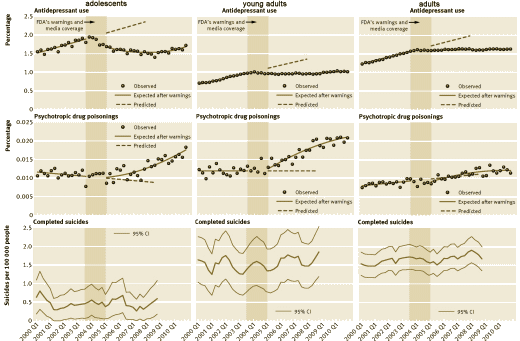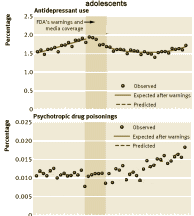The only "author’s response" I’ve ever seen where the author of a medical paper admitted culpability in response to criticism was when Dr. Gibbons,  Dr. Kupfer, et al apologized for lying about COI after being exposed. And in that apology, they didn’t get around to apologizing to Dr. Carroll for their initial nastygram in response to his criticism of their paper [careful watching…]. So I’m not surprised that Dr. Lu et al [Changes in antidepressant use by young people and suicidal behavior after FDA warnings and media coverage: quasi-experimental study] defended their recent attempt to malign the Black Box Warning on antidepressants in youth. They’ve mounted two responses to the outcry about that flawed paper – both of which are filled with marshmallows and have the substance of the Pillsbury Dough·Boy.
Dr. Kupfer, et al apologized for lying about COI after being exposed. And in that apology, they didn’t get around to apologizing to Dr. Carroll for their initial nastygram in response to his criticism of their paper [careful watching…]. So I’m not surprised that Dr. Lu et al [Changes in antidepressant use by young people and suicidal behavior after FDA warnings and media coverage: quasi-experimental study] defended their recent attempt to malign the Black Box Warning on antidepressants in youth. They’ve mounted two responses to the outcry about that flawed paper – both of which are filled with marshmallows and have the substance of the Pillsbury Dough·Boy.
Changes in antidepressant use by young people and suicidal behavior after FDA warnings and media coverage: quasi-experimental study
Author’s Replyby Christine Y. Lu, Gregory Simon, and Stephen SoumeraiBritish Medical Journal. 2014 348:g3596.
by Gregory E Simon, Christine Lu, and Stephen SoumeraiBritish Medical Journal. 2014 348:g3596.
… Nevertheless, we must acknowledge that psychotropic poisoning is an imperfect proxy for suicide attempt and that use of this proxy measure might reduce the sensitivity of our methods. But this proxy measure is preferable to use of cause-of-injury codes in settings where use of those codes varies over time [precluding any valid time series analysis].
They want us to argue with their pretty graphs:

 I don’t care to enter that argument because I don’t accept that the graph is related to the question at hand – because it isn’t. Again, end of story. I was tempted to argue with their analysis after removing their imputed lines from the graph. I’m not convinced that a straight line isn’t a better fit than their fancy quadratic quaisi-experimental fitting, particularly if you remove the last data point [that creates something of an optical illusion]. But I realized that line of criticism is just my bias engaging their flawed study. As I said previously in our own eyes…:
I don’t care to enter that argument because I don’t accept that the graph is related to the question at hand – because it isn’t. Again, end of story. I was tempted to argue with their analysis after removing their imputed lines from the graph. I’m not convinced that a straight line isn’t a better fit than their fancy quadratic quaisi-experimental fitting, particularly if you remove the last data point [that creates something of an optical illusion]. But I realized that line of criticism is just my bias engaging their flawed study. As I said previously in our own eyes…:If someone actually did a non-jury rigged study that said that the black box warning is wrong, I wouldn’t change a single thing in the way I personally do things. David Healy says why best when he talks about getting doctors to "doubt our own eyes." See Akathisia once, a dramatic change in personality and the aggression that comes with the drug, that then disappears when the drug is withdrawn, and you’re on alert. See it the second time and that’s enough for this old man. It might as well be an epidemic. And given the fact that I’m an infrequent prescriber, that I’ve seen it often enough makes it real for me. I would bet it’s even under-reported because the patients stop that drug and don’t go back to see that doctor. I’ve prescribed SSRIs to adolescents and young adults infrequently, and only when I’ve said my spiel and am comfortable that I and competent others can keep close tabs. I can’t imagine anything ever changing that. There have been some successes, some failures, and much indifference. So I’m glad the black box warning slowed down the accelerating rate of prescribing – even in an HMO. And what I’ve seen with my eyes trumps epidemiology on large datasets.
There were clinically and statistically significant changes in antidepressant use [both marked slope and level changes that did not recover for 6 years] and psychotropic poisonings [sharp, immediate and sustained increases in slope] immediately after the warnings among young people. But, to be conservative, we calculated effect sizes only in the second year, even though they persisted for several years.
I have not seen the challenges to the original paper as widely disseminated in the popular press. Even now, if you google it, most of the results are stories off of the research of Dr. Lu et al, not the ones questioning the results in their paper.
We have simply reached the point in this and other countries where we tout these great insights on page one of the newspaper and print the retraction on page six. The damage is done, the concept is in front of the general public and the retraction or conflicts are never to be seen or heard.
Marketing has replaced substance, and sales are now the only arbiter of success, and the goal of people in these positions is funding for the next grant proposal.
Steve Lucas
Steve Lucas. You are right. The corruption is deeper than most of us imagined. But systems of medicine and health care still depend on trust, the public’s trust. When the results are worse than should be expected, as in the USA compared to more civilized countries, with single-payer systems, where outcomes are better at considerably lower cost, change cannot be avoided. It may come slowly or suddenly, perhaps dramatically, hardly silently. Ever more people discover that we’ve been had, are cheated, that harm rather than better health often is standard healthcare, every 3. death in the USA due to iatrogenic injury and preventable mistakes, people start to question and look for alternatives, unless the power to choose is lost and the totalitarians are in charge. But when the core rots, empires crumble, in medicine too.
http://www.help.senate.gov/hearings/hearing/?id=478e8a35-5056-a032-52f8-a65f8bd0e5ef
1000 preventable deaths every day…